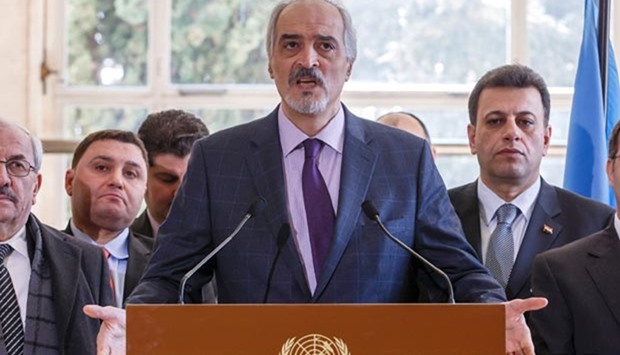Talks to end Syria's civil war opened in Geneva on Monday, but hopes for a breakthrough remained remote with the sides locked in a bitter dispute over the future of President Bashar al-Assad.
The UN-hosted negotiations, which began a day before the fifth anniversary of the outbreak of the conflict, are the latest effort to end violence that has killed more than 270,000 people and displaced millions.
As the delegations arrived in Geneva over the weekend, Damascus warned that any discussion about removing Assad would be a "red line".
Top Western diplomats immediately condemned the comment from Syrian Foreign Minister Walid Muallem as divisive and provocative.
After his first official meeting with the regime on Monday, UN envoy Staffan de Mistura told reporters that "strong statements (and) rhetoric" were part of every tough negotiation and that his initial discussions with government representative Bashar al-Jaafari were "useful".
Speaking earlier, he said the talks quickly needed to focus on "the real issues".
"What is the real issue?" he asked. "The mother of all issues (is) political transition."
The UN envoy said the agenda for the negotiations will follow a Security Council resolution that calls for a transitional government to be formed in six months, and general elections within the following year.
Wrangling over delegations
A lot has changed since the last round of indirect talks collapsed in February, particularly for many of Syria's war-ravaged people who have previously been deprived of regular access to life-saving aid.
A temporary ceasefire introduced on February 27 has largely held, despite accusations of violations from both sides, allowing aid to reach some 150,000 people living under siege.
The truce - the most significant since the conflict began - has sparked cautious encouragement.
But experts warn that negotiations will still struggle to achieve a durable peace on the fractured battlefields where multiple groups are competing for dominance.
Representatives from Syrian Kurdish groups, which have played a key role in combating jihadist fighters, have been excluded from the talks despite a push from Russia.

United Nations envoy for Syria Staffan de Mistura
speaks during a press conference in Geneva
Russian Foreign Minister Sergei Lavrov reaffirmed Moscow's position on Monday, saying that "the whole spectrum of Syrian political forces" should have a voice in Geneva.
"Otherwise this cannot claim to be a representative forum," he was quoted as saying by the RIA Novosti state news agency.
Beyond the contentious issue of Kurdish participation, Damascus has during previous peace efforts sought to veto various opposition figures and branded others as "terrorists".
Jaafari said he pressed the point again with de Mistura on Monday, asking for details of those invited and whether "all the delegations have been treated with equal criteria."
"The rule of the game will be inclusiveness," de Mistura said, adding that he was open to broadening the list of delegates as early as this round of negotiations, which is expected to last until March 24.
A second round of roughly two weeks of talks would start after a brief recess, followed by third round, at which point de Mistura said he hoped there would be a "clear roadmap" for a permanent deal.
No 'plan B'
The UN envoy acknowledged the huge divisions between the opposing sides, with Assad's fate and the prospect of holding elections standing out a key hurdles.
But, he stressed, walking away from dialogue was not an option.
"As far as I know, the only plan B available is the return to war, and to an even worse war than we had so far," he said.
Analysts have said the talks are largely a forum for international powers involved in the conflict, and that the strategic interests of the US and regime ally Russia will be crucial to determining the shape of a possible deal.
De Mistura told reporters that if progress appears impossible, he will turn to the "real peacemakers", referring to Washington, Moscow and the UN Security Council.
"We will bring the issues back to those who have influence," if negotiations go nowhere, he said.
The leverage of major powers over Syria's warring parties has its limits, however, as half of Syria's territory is controlled by jihadists from the Islamic State (IS) group or Al-Qaeda affiliate Al-Nusra Front, neither of which are included in the ceasefire.
Russia has continued to focus its airstrikes on the jihadist groups since the truce came into effect last month, pounding Islamist stronghold areas around the ancient city of Palmyra throughout the weekend, among other targets.

